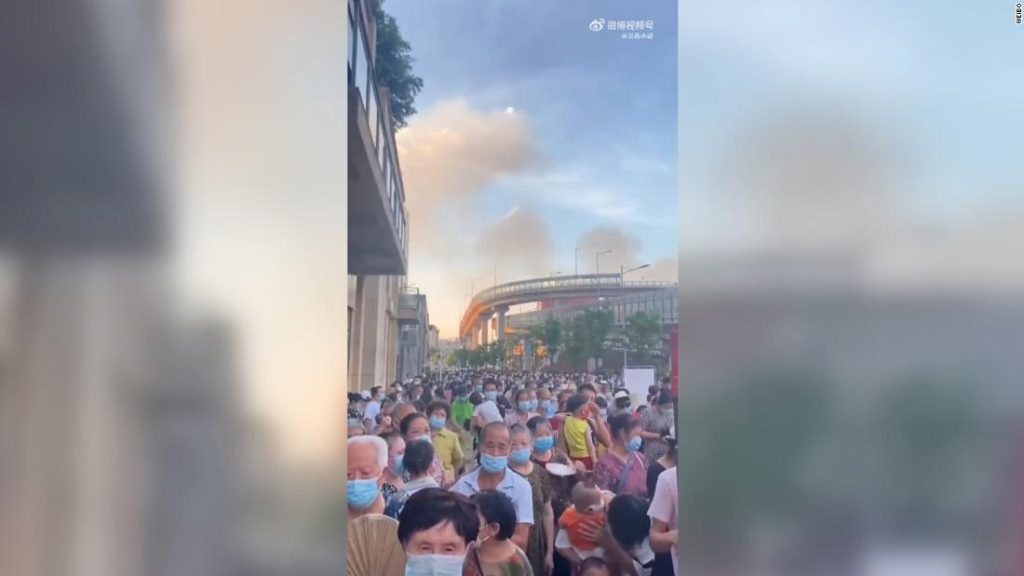
Authorities ordered more than 10 million people in downtown urban areas to undergo mandatory Covid tests on Wednesday, when Chongqing’s highest temperature exceeded 40 degrees Celsius (104 degrees Fahrenheit).
A widely circulated video shows a crowded street with hundreds of people apparently waiting in line for Covid tests, most wearing face masks and some fanning themselves to cool off the heat. In the background, plumes of smoke from wildfires rise above the pale orange horizon.
“The temperature is 43 degrees, the temperature of Chongqing residents has exceeded the maximum,” said a resident on the Chinese Twitter-like Weibo platform.
To ensure residents in central areas comply with the testing mandate, authorities have turned health symbols on everyone’s mobile phones orange. The icons will only turn green after you complete the Covid tests.
The green code is a prerequisite for the continuation of daily life in China, where freedom of movement is enforced through a color code system imposed by the government to control the spread of the virus.
Residents who have not been tested will not be allowed to attend gatherings, meetings or commercial activities, nor can they enter crowded and closed public places, according to authorities.
Zeng Meng, 42, a resident of Chongqing, said a message on his health code app asked him to take a Covid test around midnight on Wednesday.
“Forcing more than 10 million people to take Covid tests in high temperatures is unfortunate,” he said. “This is neither scientific, nor reasonable, nor legal.”
Zeng said people started lining up for tests at his apartment complex in the early hours of Wednesday, but he refused to take the tests. On Thursday, he said, he was denied entry to a supermarket because of an orange symbol on his health app.
He said, “The excessive measures against Covid have caused us great inconvenience. Many of my friends are upset about being forced to take Covid tests.”
Forest fires and power outages
On social media, residents of downtown Chongqing complained of smelling smoke inside their apartments, while others posted pictures of burning embers from the fires that reached their balconies.
Local authorities said bushfires have broken out since August 18 in multiple remote areas. The municipality is home to more than 32 million people.
The wildfires are another indirect effect of an intense heat wave – the worst since 1961 – that has swept the southwest, central and eastern parts of the country in recent weeks, with temperatures exceeding 40 degrees Celsius in more than 100 cities.
The heat wave in China has also increased demand for air conditioning and curtailed hydropower due to the drought that hit the Yangtze River and its commercial waterways in the country.
This week, Sichuan Province, neighboring Chongqing, extended temporary power outages at factories in 19 of 21 cities in the region. The blackouts will last until at least Thursday, in a move the local government said would ensure residential power supplies. Last week, the provincial capital, Chengdu, began dimming the lights at subway stations to save electricity.
The electricity crisis dealt a severe blow to farmers, who saw crops and livestock wither and die in scorched fields and scorching sheds.
“I’m watching them die,” said the owner with tears. “The temperature was very high yesterday, but they cut off the electricity.”
On Tuesday, Chinese authorities including the Ministry of Agriculture and Rural Affairs and the Meteorological Administration jointly issued an emergency notice, asking local authorities to reduce the impact of drought and high temperatures on the country’s autumn grain production.
Local authorities were asked to “issue early warning information, expand drought-resistant water sources, and direct the development of cloud seeding.”
The Meteorological Administration said on Tuesday it had sent a high-performance aircraft to Chongqing to help conduct cloud seeding, according to state-run CCTV.
Chongqing meteorological authorities said the aircraft will coordinate with 107 anti-aircraft guns and 96 missiles on the ground to create a precise precipitation, CCTV reported.
CNN’s Simon McCarthy contributed to this report.

“Travel specialist. Typical social media scholar. Friend of animals everywhere. Freelance zombie ninja. Twitter buff.”





More Stories
Taiwan is preparing to face strong Typhoon Kung-ri
Israel orders residents of Baalbek, eastern Lebanon, to evacuate
Zelensky: North Korean forces are pushing the war with Russia “beyond the borders”